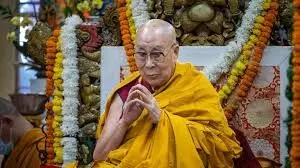Dalai Lama at 90: A Life Rooted in Faith, Shaped by Resistance
As the Dalai Lama turns 90, his life reflects a legacy of spiritual leadership, peaceful resistance, and Tibet’s ongoing struggle for identity and autonomy.
image for illustrative purpose

As Tenzin Gyatso, the 14th Dalai Lama, turns 90 today, his life story stands as a powerful symbol of spiritual leadership and non-violent resistance. Far from a ceremonial milestone, his birthday marks nine decades of unwavering dedication to Tibetan identity, culture, and autonomy—much of it spent in exile.
A Spiritual Journey Begins
Born as Lhamo Thondup in 1935 in northeastern Tibet, he was identified as the reincarnation of the 13th Dalai Lama at the age of two. Enthroned by five and thrust into political leadership by 15, the young Dalai Lama faced a rapidly changing world as China’s Communist Party rose to power under Mao Zedong.
Tibet’s Political Upheaval
Tensions escalated when Tibet rejected Chinese overtures of reunification. In 1950, Chinese forces invaded, followed by the controversial 17-point agreement in 1951, which led to years of unrest. In 1959, after a failed uprising in Lhasa, the Dalai Lama fled to India with 80,000 followers, establishing a government-in-exile in Dharamshala.
A Global Voice for Tibet
From exile, the Dalai Lama became the face of the Tibetan cause on the global stage. He appealed to the United Nations, engaged with world leaders, and proposed multiple frameworks for a peaceful resolution. Over time, he shifted his demands from full independence to seeking “genuine autonomy” for Tibetans within China.
His advocacy earned him the Nobel Peace Prize in 1989, recognizing his commitment to peace, dialogue, and human rights.
Separating Politics from Spirituality
In 2011, the Dalai Lama took a historic step by separating his political role from his spiritual authority, allowing the Tibetan exile community to operate under a democratic parliamentary system. The government-in-exile now addresses the social and welfare needs of over 100,000 Tibetan refugees.
Uncertain Future
As the Dalai Lama turns 90, the issue of succession has become increasingly complex. While he has hinted at possibly ending the reincarnation tradition or appointing a successor from outside Tibet, Beijing insists any successor must be approved by the Chinese government—a claim the Dalai Lama firmly rejects, stating the decision lies with a spiritual trust, not a political regime.
A Legacy of Peaceful Defiance
Today, the Dalai Lama remains the moral and spiritual compass of a movement rooted in compassion, non-violence, and cultural preservation. Though in exile, his presence continues to inspire generations fighting for the survival of Tibet’s identity.
As the world celebrates his 90th birthday, his legacy stands as a testament to the enduring power of faith and resistance in the face of political adversity.

